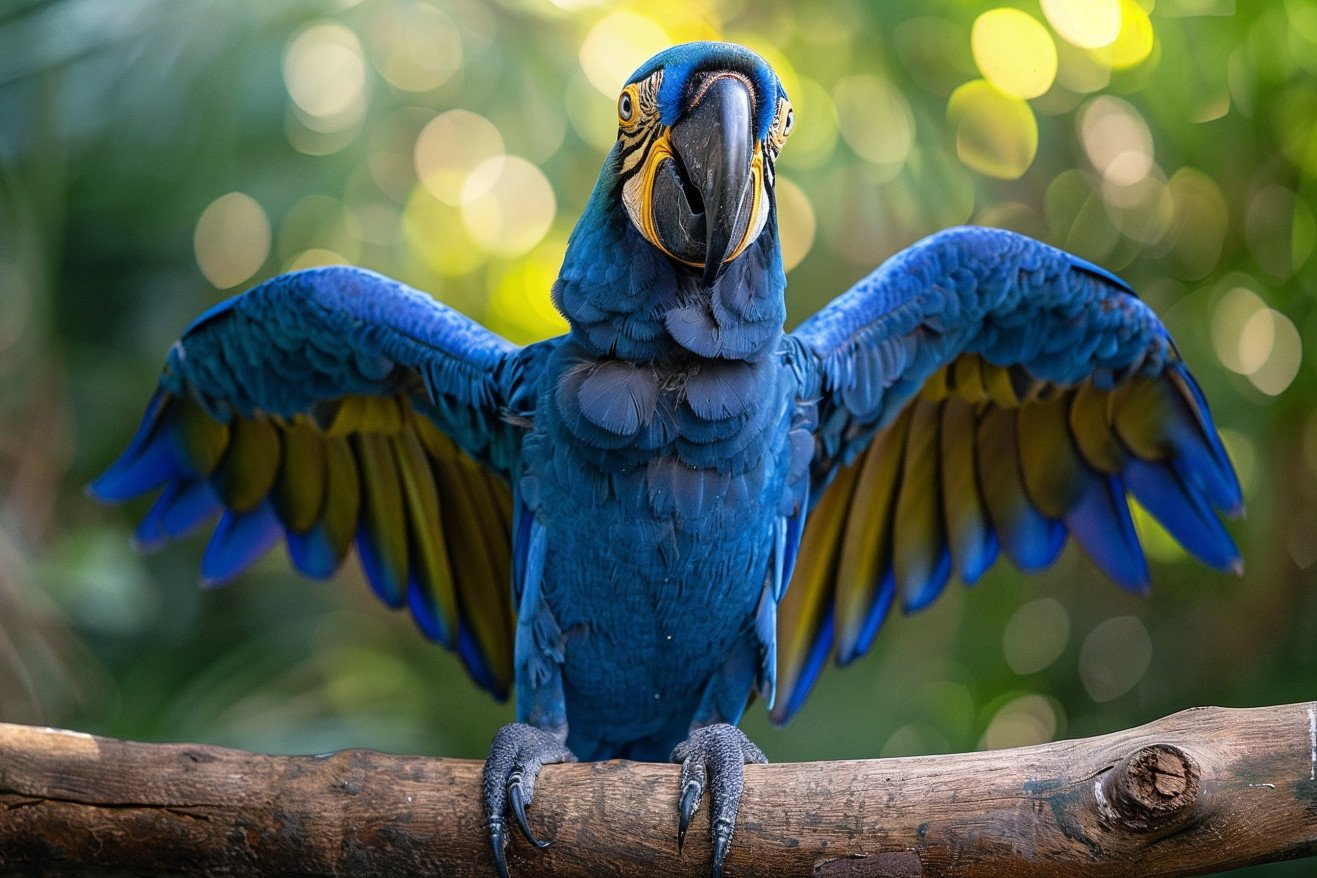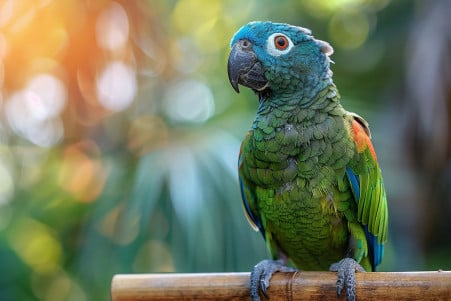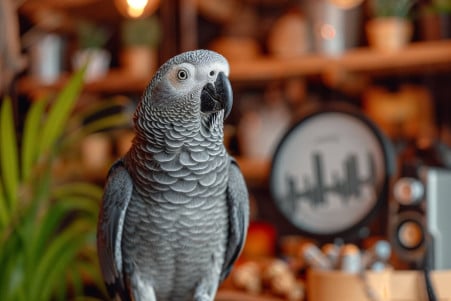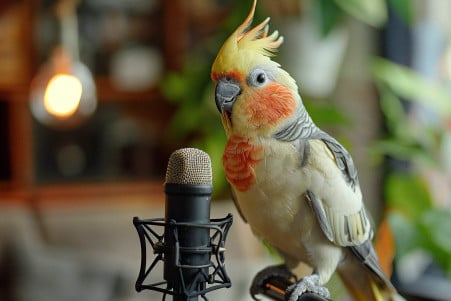Can Macaws Talk? A Look at Their Incredible Ability to Imitate Human Speech
28 May 2024 • Updated 27 May 2024

With their bright plumage and large size, macaws are perhaps best known for their ability to talk, but how good are they really? Macaws are a type of parrot, a family of birds that includes some of the most talented vocal mimics in the world. They can accurately mimic a wide variety of sounds, words, and even phrases when they are repeatedly exposed to them by their human caregivers. Some species of macaws, such as the blue-and-gold macaw, are even known for being especially good talkers.
In this article, we will explore the scientific evidence behind macaw vocalizations to learn more about their cognitive capacity for speech imitation. By examining research on avian vocal learning, brain structure, and case studies, we will discover how and why these colorful birds are able to produce such human-sounding speech. By the end, you will have a better understanding of the amazing vocal abilities of our avian companions.
Can Macaws Talk?
What Makes a Macaw Talk: Vocal Anatomy and Brain Structures
The ability of macaws to talk is due to their vocal anatomy and brain structures. Macaws, like other parrots, have a vocal organ called the syrinx, which is located at the base of the trachea. As described in a TED-Ed video, the syrinx is responsible for the parrots' wide range of vocalizations and the high level of control they have over their vocalizations.
However, the size and shape of the syrinx is different in different species of parrots, and macaws have been found to have larger syrinxes than other parrots, which may help explain why some macaws are better at talking than others. Macaws also have a highly developed auditory system that allows them to hear and understand complex sounds, which is a prerequisite for vocal learning, according to a study mentioned in the TED-Ed video.
In addition to their vocal anatomy, macaws have brain structures that enable them to learn to talk. As one article notes, macaws have a "song system" in their brains that is similar to that of songbirds, which allows them to have precise control over their vocalizations. Their complex neural connections and vocal musculature enable them to control the flow of air and accurately reproduce the sounds of human speech.
By combining the power of their syrinx with the modulation of their tongue, macaws can use their unique anatomy to accurately reproduce human words and phrases. This anatomy helps explain why macaws are such good talkers.
Which Macaw Species Talks the Best? A Comparative Look
Not all macaw species are created equal when it comes to their ability to talk. For example, Macaw Personality Differences singles out the blue-and-gold macaw as one of the best talkers among macaws. Other species with good talking abilities include the military macaw, Camelot macaw, and scarlet macaw.
That said, individual differences in personality, socialization, and training can also play a role in a macaw's ability to talk. For example, the article mentions that despite being raised in the same environment, the Camelot macaws Tusa and Comet had different personalities and talking abilities. Meanwhile, a PetMD article explains that while macaws can learn to talk and develop a "reasonable vocabulary", they need to be trained more than other parrot species with exceptional talking abilities.
Comparing the talking abilities of different macaw species can help to tease apart the roles of genetics and anatomy in their ability to mimic human speech. For example, a Phys.org study found that macaws had vocal repertoires of 20-30 words on average, which is less than the 60-word averages of African grey parrots and cockatoos. By understanding these differences between species, researchers can better understand the factors that have led to macaws' impressive but not quite as impressive as other species' talking abilities.
How to Train a Macaw to Talk
Training a macaw to talk successfully takes time, dedication, and positive reinforcement, according to How to Teach Your Pet Bird to Talk. It is best to start with simple, one-syllable words and then work up to more complex sentences. In addition, as the PetHelpful guide notes, it is important to repeat words frequently, and using the same tone each time will help the bird make the connection.
Another way to help your macaw learn words is to associate them with specific objects or actions, as the wikiHow Pet article points out. It is also important to make sure that you are creating a positive and supportive environment and that you are bonding with your macaw. The PetHelpful guide warns against using voice recordings and instead recommends that macaw owners focus on direct interaction and training to ensure success.
With these methods in mind, macaw owners can use these tried-and-true methods to help their birds learn to talk, which will help them strengthen their bond and communicate more effectively.
The Science of Vocal Learning: Parrot Speech and the Song System
Parrots, including macaws, have a specialized brain region called the 'song system' that enables them to learn and produce complex vocalizations, according to research by Erich Jarvis, a neuroscientist at Duke University who studies vocal learning. This rare trait is shared by only a few other animal groups, including humans and some marine mammals.
Irene Pepperberg's research has demonstrated that parrots can not only mimic human speech, but also understand the meaning of words when trained to do so. The Northern Parrots article explains that while parrots may only develop communication abilities equivalent to a 2-3 year old human, their brains are built for vocal learning.
This talent for speech acquisition is likely an evolutionary adaptation to help parrots communicate and bond with one another in their flocks, as the Audubon article explains. Research into the cognitive mechanisms that underlie vocal learning in parrots can help us better understand how these birds are able to talk, a skill that has fascinated and amazed people for centuries.
The Talking Macaw: A One-of-a-Kind Pet and Performer
Macaws that can talk are often seen as fun, interactive pets. Per Macaw Facts, this is because macaws are social birds, and this social nature is the key to training them to talk. Their ability to talk can also help them form a closer relationship with their owner, especially since, as the SeaWorld article points out, macaws are playful and curious.
Talking macaws can also provide mental stimulation and entertainment for their owners. As the BeChewy article explains, the "wonderful thing about talking is that it is an experience you can share with your parrot no matter what level of tameness it is." That said, owning a talking macaw is a long-term commitment that requires patience and a deep understanding of the bird's needs and care.
Proper socialization and responsible ownership are essential to ensuring the well-being of these intelligent, vocal birds. As the Macaw Facts article points out, "a frightened parrot who does not trust you will stay quiet and far from you." With the right care and attention, however, owners can help their macaw reach its full potential as a talker.
Conclusion: Macaws Can Talk (and Swear!)
Macaws are some of the most talented talking birds and can mimic a wide variety of human speech with great clarity. Their unique vocal anatomy, specialized brain regions, and cognitive abilities all contribute to their remarkable talking skills. However, while some macaw species are better talkers than others, individual personality and training also play a big part.
While owning a talking macaw can be a fun and rewarding experience, it requires patience, dedication, and knowledge of their specific requirements. Understanding and celebrating macaws' remarkable talking abilities can help us better understand and appreciate these intelligent and colorful birds.


